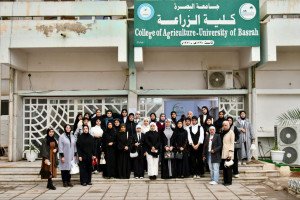
A doctoral thesis at the College of Agriculture, University of Basrah discussed the introduction of sorghum powder, amylase enzymes and trans-glutaminase extracted from plant sources and their use as improvers for local wheat flour. The thesis by the researcher (Sherine Fadel Abbas) and the supervisor, Prof. Diaa Faleh Al-Fekiki) included the extraction of amylase enzyme from sprouted sorghum and trans-glutaminase enzyme from pea seeds and sprouted sorghum powder in improving the quality of baked goods and the quality of weak wheat flour, which led to an improvement in the sensory and rheological properties of baked goods. Using sorghum as an economically feasible forage crop from which enzymes can be extracted. And its content of important active compounds as a natural source of vitamins, amino acids, ascorbic acid and vitamin E. As for the most important conclusions that were reached during the study, the germination process plays a role in the high content of effective compounds represented by the content of flavonoids, phenols, tannins and antioxidants, and the development of amino acids, water- and fat-soluble vitamins and minerals. Mineral during the different stages of germination, and the use of enzymatic treatments to improve the qualitative characteristics of baked goods The most important thing recommended by the study is to conduct a joint study between the Department of Food Sciences and the Department of Field Crops by planting large areas of the sorghum crop, then carrying out harvesting and milling operations, studying the qualitative and rheological characteristics of sorghum flour and introducing it into the bakery industry due to its high content of proteins and fibers, and the use of grains and seeds. During the different stages of germination for the development of most of the active compounds and enzymes that can be used during the manufacturing processes







